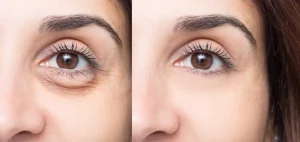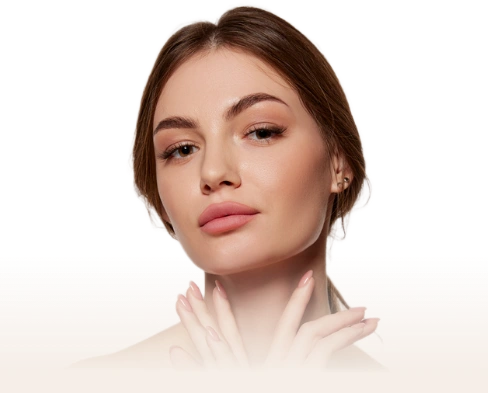Acne are swollen, small, hard lumps that are actually acne lesions. They can be frustrating, especially when it appears on the neck. Neck acne can appear in various forms and can affect both men and women. One particularly severe type is cystic acne, characterized by large, painful, pus-filled cysts that form deep within the skin.
Another condition often mistaken for acne is Acne Keloidalis Nuchae (over-aggressive skin healing that causes thick scars), which involves inflammation and scarring at the nape of the neck, primarily affecting men with curly hair. Acne on the neck may be less common than facial acne, it can be just as problematic. However, understanding these conditions is essential for effective treatment and prevention of acne on the neck.
This guide will help you understand the types of neck acne, effective treatment options, and prevention strategies to keep your skin clear and healthy.
What is Neck Acne?
Neck acne refers to the appearance of pimples, blackheads, whiteheads, or cysts specifically on the skin of the neck area. Acne occurs when hair follicles become clogged with oil, dead skin cells, and bacteria. This blockage leads to inflammation, which manifests as pimples or bumps. Pimples on the neck can sometimes be more irritating because the skin there is thinner and often exposed to friction from clothing, collars, or even hair products, which can exacerbate the problem.
A clinical study published in the Journal of Dermatology examined patterns of acne distribution and found that neck acne is more prevalent among teenagers and young adults, often correlating with hormonal fluctuations that increase sebum production. It can also be aggravated by external factors like sweat, friction, or certain fabrics that trap moisture and bacteria. People with oily skin or those prone to acne in other areas, such as the face or back, are more likely to develop neck acne.
It’s primarily seen in adolescents and young adults, but anyone with acne-prone skin can experience it. Hormonal changes, stress, poor hygiene, and lifestyle factors like diet or using comedogenic (pore-clogging) products on the neck can contribute.
What are the different types of acne on the neck and their symptoms?
Acne on the neck can come in various forms. These types can help identify the best treatment methods for both males and females.
Pustules on Neck
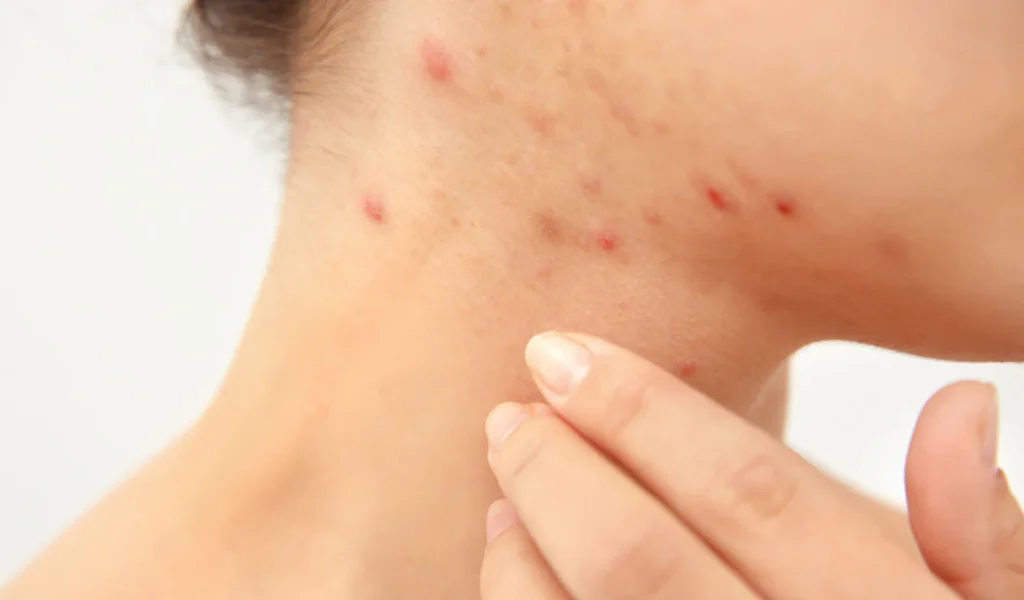
Pustules on the neck are a type of inflammatory acne characterized by small, red bumps topped with white or yellow pus. They form when hair follicles become clogged with oil, dead skin cells, and bacteria, causing an immune response that leads to pus accumulation. Common causes include hormonal changes, excess oil production, poor hygiene, friction from clothing or collars, and sometimes allergic reactions to skincare products.
Treatment involves keeping the area clean, using topical antibacterial or anti-inflammatory creams such as benzoyl peroxide or salicylic acid, and in more severe cases, prescription medications like topical antibiotics or retinoids. Prevention focuses on maintaining good skin hygiene, avoiding tight or irritating clothing around the neck, using non-comedogenic products, and managing sweat and oil buildup to reduce pore blockage and inflammation.
Papules
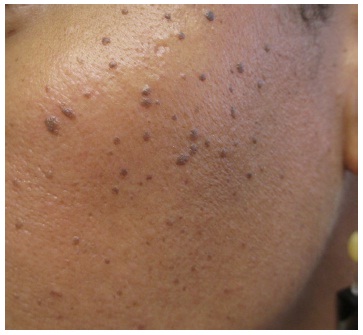
Papules on the neck are small, raised, solid bumps that usually appear red and inflamed but don’t contain pus like pustules do. They occur when hair follicles get clogged with excess oil and dead skin cells, causing mild inflammation without infection. The main causes include hormonal fluctuations, friction from clothing or accessories, stress, and using harsh or irritating skincare products.
Treatment often involves gentle cleansing, topical anti-inflammatory agents like benzoyl peroxide or retinoids, and avoiding anything that might irritate the skin further. Preventing papules relies on keeping the neck area clean and dry, wearing loose-fitting clothes, and choosing skincare products that won’t clog pores or cause irritation.
Nodules
Nodules on the neck are large, hard, and painful lumps that form deep beneath the skin’s surface due to severe inflammation of clogged hair follicles. Unlike smaller pimples, nodules are solid and don’t have a visible head or pus. They occur when the body’s immune system reacts strongly to trapped oil, bacteria, and dead skin cells, often linked to hormonal imbalances, genetics, or severe acne conditions.
Treatment usually requires stronger medical intervention, such as oral antibiotics, hormonal therapy, or isotretinoin prescribed by a dermatologist, since topical treatments alone often aren’t effective. Preventing nodules involves early and consistent acne management, avoiding skin irritation, and seeking professional care at the first signs of worsening acne to reduce the risk of scarring and long-term skin damage.
Cystic Acne
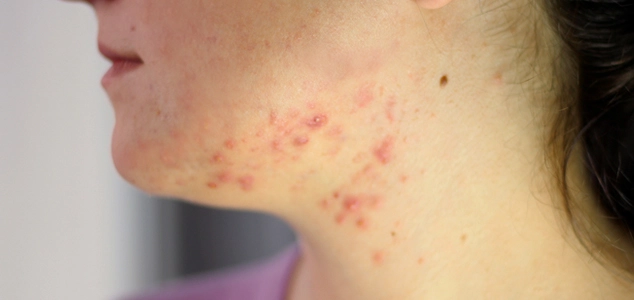
Cystic acne on the neck is a severe and painful form of acne characterized by large, swollen, pus-filled cysts deep under the skin. These cysts develop when hair follicles become heavily clogged with oil, dead skin cells, and bacteria, triggering intense inflammation and infection. Causes include hormonal imbalances, genetics, excessive oil production, and sometimes skin irritation or friction from clothing.
Treatment usually requires professional medical care, often involving oral antibiotics, corticosteroid injections, hormonal therapy, or isotretinoin, as cystic acne rarely improves with over-the-counter products alone. Prevention focuses on early acne treatment, avoiding skin irritation, and maintaining a consistent skincare routine to minimize flare-ups and reduce the risk of scarring.
Whiteheads
Whiteheads on the neck are a type of non-inflammatory acne where pores become clogged with oil, dead skin cells, and bacteria but remain closed at the surface, creating small, flesh-colored or white bumps. Unlike blackheads, which have open pores, whiteheads stay sealed, preventing the trapped material from oxidizing and turning dark. Common causes include excess oil production, hormonal changes, using heavy or pore-clogging skincare products, and inadequate cleansing.
Treatment usually involves gentle exfoliation and cleansing with products containing salicylic acid or benzoyl peroxide to help clear pores. Prevention includes maintaining good hygiene, avoiding heavy or oily products on the neck, and regularly removing sweat and dirt to keep pores from clogging.
Blackheads
Blackheads on the neck are clogged hair follicles filled with excess oil and dead skin cells, where the pore remains open to the air. The black color results from oxidation of the material inside the pore, not from dirt.
Blackheads commonly develop due to increased sebum production, hormonal changes, accumulation of dead skin, and the use of comedogenic skincare products. Treatment includes regular cleansing, exfoliation with salicylic acid, and topical retinoids to promote pore unclogging and reduce oil production. Prevention involves maintaining proper hygiene, avoiding heavy or oily products, and minimizing friction or sweating that can contribute to pore blockage.
Why Am I Suddenly Getting Acne on My Neck?
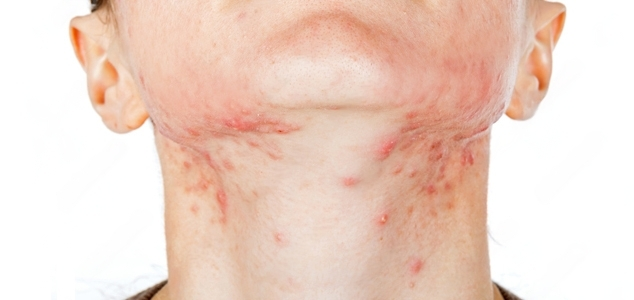
Suddenly getting acne on your neck can feel frustrating, and it usually happens because of a mix of factors that change your skin’s environment.
One common reason is hormonal fluctuations, which can occur during stress, puberty, menstrual cycles, or even certain medications, causing your skin to produce more oil that clogs pores.
Another factor could be increased friction or irritation. Maybe you started wearing tighter collars, backpacks, or scarves that rub against your neck, triggering acne mechanics.
Changes in skincare or hair products can also cause breakouts if they clog pores or irritate sensitive neck skin.
Sometimes, sweating more than usual without proper cleansing, especially after workouts or hot weather, can promote bacterial growth and inflammation.
Sudden diet changes or stress can also impact hormone levels and skin health, leading to unexpected neck acne. Identifying and adjusting these triggers usually helps clear it up.
How to Get Rid of Neck Acne?
Treating neck acne effectively involves a combination of gentle skincare, targeted treatments, and lifestyle adjustments.
First, keep the neck area clean by washing it twice daily with a mild, non-comedogenic cleanser to remove excess oil, sweat, and dirt without irritating the skin. Avoid harsh scrubbing, as the neck skin is delicate and can easily become inflamed.
Over-the-counter topical treatments containing benzoyl peroxide or salicylic acid help reduce bacteria and unclog pores, making them good first steps. For those with more stubborn or inflamed acne, topical retinoids prescribed by a dermatologist can speed up skin cell turnover and prevent new breakouts. It’s also important to avoid tight collars, rough fabrics, or anything that causes friction on the neck, as this can worsen acne mechanics.
Moisturizing with lightweight, non-comedogenic products prevents dryness and irritation. Lifestyle factors like managing stress, maintaining a balanced diet, and avoiding touching or picking at the neck acne play a big role in healing.
If acne persists or is severe, consulting a dermatologist is the best route to get personalized prescription treatments or therapies like antibiotics or hormonal treatments.
Cosmetic Treatments
Chemical Peels
Chemical peels use acids like glycolic or salicylic acid to exfoliate the skin deeply, unclog pores, and reduce acne. These treatments can improve skin texture and help fade post-acne marks on the neck. They are typically done by dermatologists or licensed professionals and may require multiple sessions.
Laser and Light Therapies
Laser treatments and light therapies, such as blue light or pulsed dye laser, target acne-causing bacteria and reduce inflammation. These procedures can help control severe or persistent acne and minimize scarring, often used in combination with other treatments.
Micro-needling
Microneedling involves tiny needles creating micro-injuries in the skin, which stimulates collagen production and can improve acne scars and overall skin texture on the neck. This is a cosmetic option usually performed by dermatologists.
Professional Extractions
In some cases, a dermatologist or licensed esthetician can perform professional extractions to safely remove blackheads or whiteheads on the neck, reducing the risk of further irritation or scarring compared to at-home popping.
Combining these cosmetic treatments with a solid daily skincare routine and lifestyle adjustments tends to offer the best results for neck acne. Always consult a dermatologist before starting cosmetic procedures to ensure they’re suitable for your skin type and condition.
NOTE: If you’re seeking professional solutions to effectively treat neck acne, consider exploring the comprehensive guide on the Best Acne Treatments offered by Dr. Syra Aesthetics. This resource delves into advanced cosmetic procedures such as microneedling, Intense Pulsed Light (IPL) therapy, resurfacing, chemical peels, and anti-inflammatory injection therapy.
Struggling with neck acne that won’t clear up? Whether it’s hormonal, bacterial, or texture-related, our 60-second planner helps identify what’s really going on and which treatments can help. From Lumecca IPL to PRP and functional medicine support, get personalized, expert-matched solutions designed around your skin and symptoms.
How Can You Treat a Pimple on Your Neck?
Neck pimples are a very common skin condition and treatable with the right combination of products. Treating pimples on the neck involves a combination of good hygiene practices, topical treatments, and sometimes oral medications. Here’s a detailed look at effective treatment options.
Hormonal Therapies
For acne caused by fluctuating hormones, hormonal therapies can be effective. These might include oral contraceptives for women or anti-androgen medications that help regulate hormones that cause acne.
Topical Treatments
Topical treatments, such as benzoyl peroxide or retinoids, can be applied directly to the affected area to reduce acne causing bacteria and unblock pores.
Keep Your Neck Clean and Let it Breathe
Maintaining good hygiene is essential for preventing acne on the neck. Regularly washing your neck with a gentle cleanser can help keep pores clear and reduce the risk of breakout on neck. Pat dry with a fresh and clean towel. Avoiding tight clothing or accessories that can irritate the skin is also crucial in preventing acne flare-ups.
Oral Medications
Oral antibiotics can be prescribed to reduce acne causing bacteria and inflammation from within. For more severe cases, medications like isotretinoin may be considered.
Salicylic Acid
Salicylic acid helps exfoliate the skin and unclog pores. It can be found in cleansers, spot treatments, and pads specifically designed for acne treatment.
Besides, for the treatment, you can go for facial acne treatments as they work for neck acne as well.
How to Treat Neck Acne Professionally?
For persistent or severe acne on the neck, consulting a professional is essential. Professional treatments can provide more effective and lasting results.
According to the research, combining oral antibiotics with other acne treatments such as benzoyl peroxide and retinoids can be more effective in reducing acne lesions than using either treatment alone.
Consulting with a Dr. Syra Hanif, offers several benefits. Doctor provides personalized acne treatments, advanced therapies such as laser treatments, and professional-grade products that are more effective than over-the-counter options.
Are there any home remedies for acne on the neck?
Yes, there are some home remedies you can try for acne on the neck, though their effectiveness varies from person to person.
Simple steps like keeping the area clean by gently washing with a mild cleanser can help prevent buildup of oil and dirt. Natural ingredients like tea tree oil are popular because of their antibacterial and anti-inflammatory properties; diluting a few drops with a carrier oil and applying it carefully can reduce redness and bacteria.
Aloe vera gel is soothing and can calm irritation and inflammation.
Some people use honey masks because honey has antimicrobial effects and can help with healing.
Gentle exfoliation with natural ingredients like oatmeal or a soft washcloth may help remove dead skin cells, but be cautious not to overdo it as the neck skin is sensitive.
Maintaining good hygiene, avoiding tight or irritating clothing, and ensuring sweat doesn’t stay trapped on the skin are also key.
While these remedies can support skin health, they aren’t a guaranteed cure, especially for moderate to severe acne, and persistent cases should be evaluated by a dermatologist for appropriate medical treatment.
How to Prevent Neck Acne?
Preventing neck acne involves a combination of lifestyle changes and proper skincare routines. Here are some tips:
- Maintain good hygiene: Regularly wash your neck and avoid touching it with dirty hands.
- Choose non-comedogenic products: Use skincare and haircare products that won’t clog your pores.
- Avoid tight clothing: Wear breathable fabrics and avoid accessories that can irritate your skin.
- Manage stress: Stress can trigger acne, so practices like meditation and exercise can help.
- Monitor diet: Some foods can exacerbate acne, so maintaining a balanced diet may help.
What Causes Neck Acne?
The first thing to know about neck acne is that the same causes of facial acne trigger it. However, several factors can contribute to zits on the neck.
Skin Type
Oily skin types are more prone to acne due to excess sebum production that can clog pores. Some people may require medical intervention if they have especially oily skin.
Comedogenic Products
Products that clog pores can lead to the formation of body acne. It’s important to use non-comedogenic skincare and haircare products.
Skin Irritation
Irritation from clothing, accessories, or harsh skincare products can trigger acne.
Poor Hygiene
Not washing your neck regularly or thoroughly can lead to the accumulation of dirt and oil, causing acne.
Stress
Stress can increase the production of hormones that trigger acne.
Fluctuations in Hormones
Hormonal changes during puberty, menstrual cycles, or due to medical conditions can cause acne.
Most minor neck pimples respond well to home remedies and over-the-counter (OTC) medications and should resolve within a few days. To treat acne lesions and reduce outbreaks, consult your primary care physician.
What Happens If You Leave Neck Acne Untreated?
If you leave neck acne untreated, it can lead to several issues that might make the problem worse over time. Initially, the acne lesions whether they’re pimples, pustules, or cysts can become more inflamed and painful, increasing discomfort. Without treatment, clogged pores continue to trap oil and bacteria, causing acne to spread or worsen.
Untreated neck acne, especially if it’s moderate to severe, increases the risk of scarring and hyperpigmentation of dark marks or uneven skin tone that can linger long after the pimples heal.
Chronic inflammation may also cause the skin to thicken or develop lumps known as nodules, which are harder to treat. Additionally, constant irritation or picking at the acne can introduce infections or cause further damage to the skin barrier. Beyond physical effects, untreated acne might affect self-confidence or lead to emotional distress. So, while mild neck acne might clear up on its own, ignoring persistent or severe acne often results in more complicated skin issues that take longer and require stronger treatments to fix.
How to clear acne scars?
- Use topical treatments: Products with ingredients like retinoids, vitamin C, niacinamide, or alpha hydroxy acids (AHAs) can promote skin cell turnover and lighten scars.
- Apply sunscreen daily: Protecting your skin from UV rays prevents scars from darkening and helps them heal faster.
- Consider chemical peels: Performed by dermatologists, these exfoliate the top skin layers, improving texture and reducing scar appearance.
- Try Microneedling: This procedure stimulates collagen production to help smooth out indented scars.
- Laser therapy: Various laser treatments can resurface skin and reduce scar visibility.
- Use silicone gels or sheets: These create a protective barrier that softens and flattens raised scars over time.
Stay hydrated and maintain a healthy diet: Good nutrition supports overall skin repair. - Avoid picking or squeezing acne: This prevents new scars from forming.
Frequently Asked Questions
Why Do I Suddenly Get Acne in My 30s?
Acne in your 30s can be due to hormonal changes, stress, or lifestyle factors. It’s not uncommon for adults to experience acne due to shifts in their body’s hormonal balance.
Why Do I Suddenly Get Acne in My 40s?
In your 40s, acne can be triggered by hormonal fluctuations related to menopause, stress, or changes in skincare routines.
Difference Between Neck Acne vs PCOS
Neck acne can sometimes be mistaken for acne caused by Polycystic Ovary Syndrome (PCOS). While both can present similarly, PCOS-related acne is often due to hormonal imbalances and may require specific hormonal treatments.
By understanding the types of neck acne and neck pimple causes, you can effectively treat and prevent future breakout on neck. For persistent or severe cases, consulting a professional to treat neck acne like those at Syra Aesthetics can provide tailored solutions for clear, healthy skin.
Is acne on the neck a sign of pregnancy?
Acne on the neck alone is not a specific sign of pregnancy. However, hormonal changes during pregnancy can lead to acne outbreaks in various parts of the body, including the neck. Other common signs of pregnancy include missed periods, nausea, breast tenderness, and fatigue.
Will my Severe acne scars go away?
Acne scars can fade over time, but they may not completely go away on their own. The type of scar and its severity influence how long it takes to fade. Treatments such as laser therapy, chemical peels, microneedling, and certain topical products can help improve the appearance of acne scars significantly.
Is acne on the neck hormonal?
Acne on the neck can indeed be hormonal. Hormonal fluctuations, especially in androgen levels, can stimulate the sebaceous glands in the skin to produce excess oil, leading to clogged pores and acne. This is commonly seen in adolescents during puberty and in women around their menstrual cycle or during pregnancy.
Does Lumecca IPL Treatment help to remove scars?
Lumecca IPL (Intense Pulsed Light) treatment primarily targets skin pigmentation irregularities and can help improve the appearance of some types of acne scars. It delivers light energy into the skin, stimulating collagen production and breaking down excess pigmentation. However, the effectiveness can vary depending on the type and depth of the scars.
What causes cystic acne?
Cystic acne is caused by the same factors as other types of acne, but it is more severe and deeper within the skin. It typically develops when pores become blocked with dead skin cells, oil (sebum), and bacteria, leading to inflammation and infection deep within the skin. Hormonal changes, genetics, certain medications, and environmental factors can all contribute to the development of cystic acne.
Why do Dead skin cells block pores?
Dead skin cells can block pores when they accumulate on the skin’s surface, mixing with oils and forming a plug that obstructs the pore opening, leading to acne breakouts.

About The Author
Dr. Syra Hanif M.D.
Board Certified Primary Care Physician
Dr. Hanif is the Director of Aesthetic Medicine. She is a board-certified physician in Aesthetic Medicine who specializes in using non-surgical alternatives in order to enhance one's appearance through Botox and fillers.
Read More









